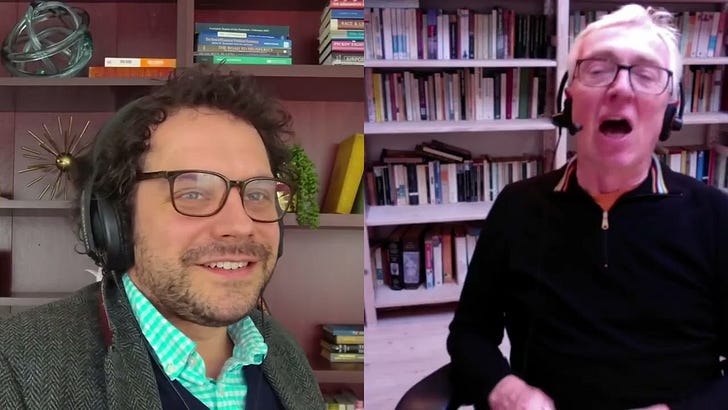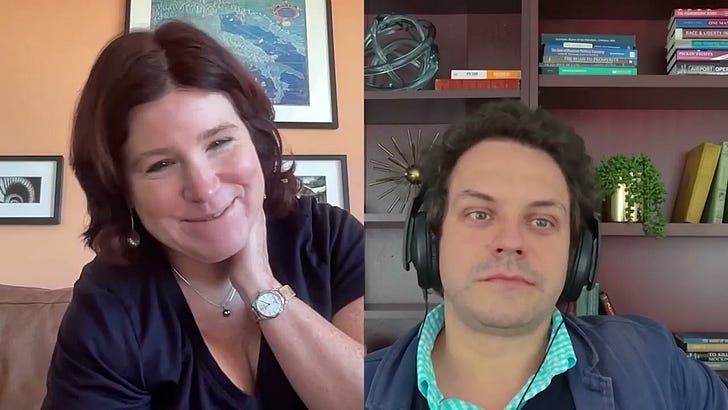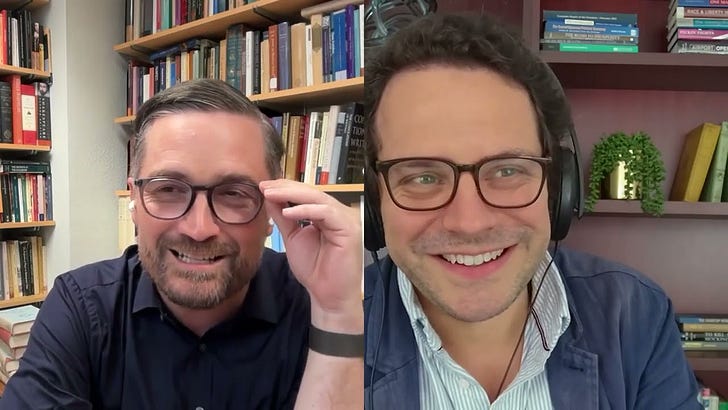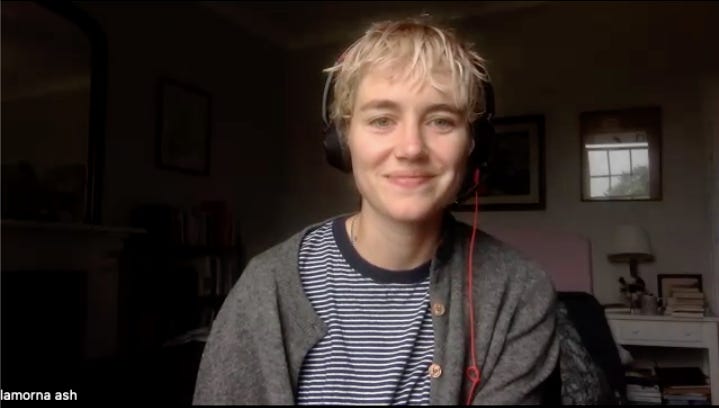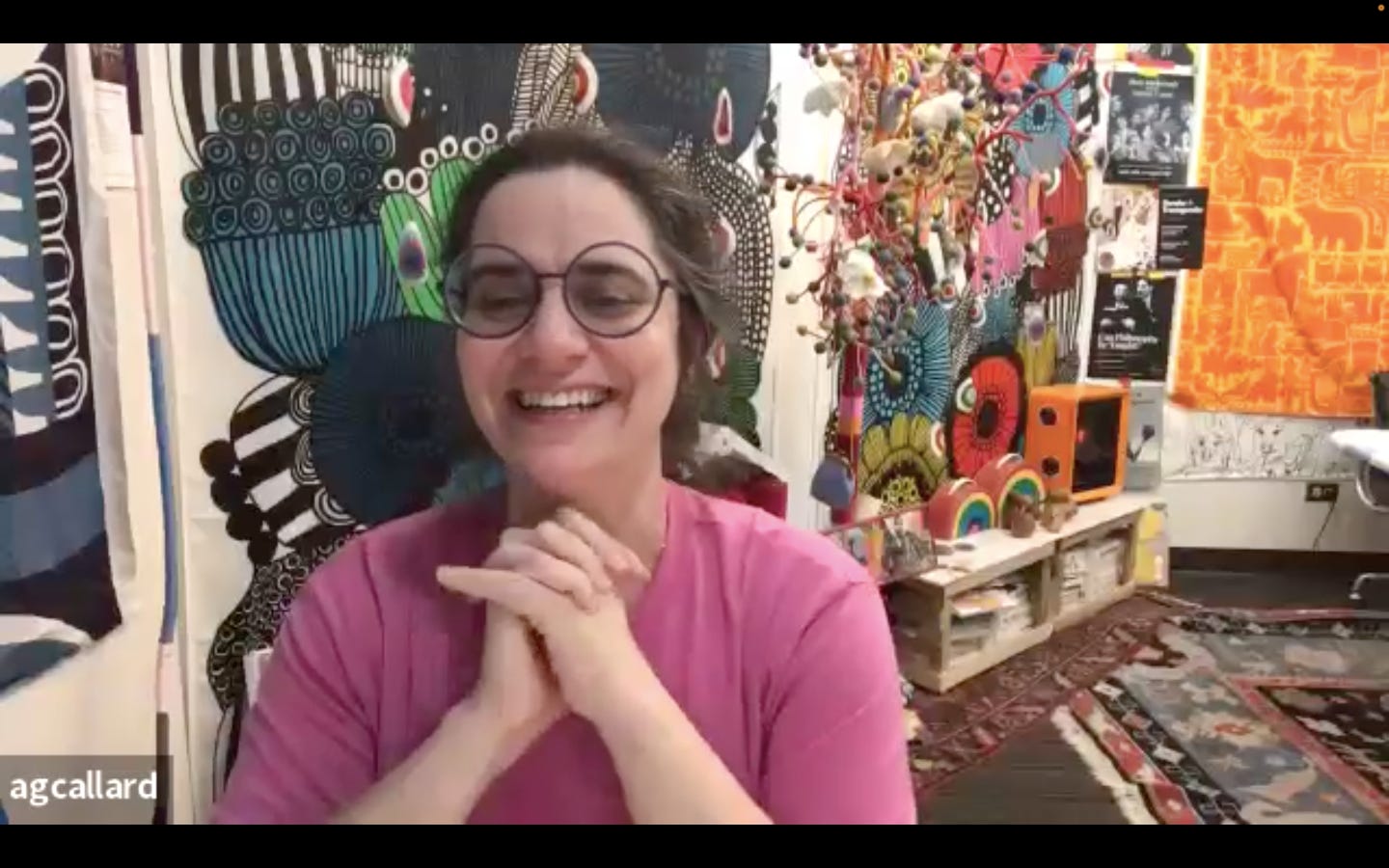Katherine Dee. Finding life where others don't.
Description
The Shakespeare Book Club meets tonight to talk about A Midsummer Night’s Dream. Zoom link here for paid subscribers.
Paid subscribers can also join this chat thread and ask me (or other subscribers) whatever they want. Tell us what you are reading, what you disagreed with me about this month. Ask niche questions someone here might be able to answer. Ask me anything you like (I might not answer!) This is an experiment... let's see where it goes... Join the chat.
Katherine Dee Interview
When we have strong feelings about literary characters, isn’t that somewhat the same as ficto-romantics—people who fall in love with fictional people and create part of the identity around that relationship? This is the sort of question you can talk about with Katherine Dee.
I am a long-time fan so I was delighted to be able to ask her about the way AI is changing writing, fandom in culture, role play writing, fan fiction, ficto-romance, internet culture, and the way technology is changing what we read, how AI is changing Katherine’s writing, and how she uses ChatGPT to discuss her emotional life (she says it is pretty good!).
Katherine is one of the most interesting Substackers, writing at default.blog, as well as writing for other publications. You might remember her piece called “No. Culture isn’t stuck”. I find her case-studies especially interesting (this is the one we talked about in the interview). Katherine is not judgemental: she simply tires to understand. Here is her Twitter.
Here’s what Katherine told me about fandom in modern culture.
Henry: Why is there so much fandom in modern culture? We've got LARPing, people having AI boyfriends and girlfriends, fictoromance. You're writing about all these things all the time. Why is this such a big part of culture?
Katherine: That's a great question. I think that the foundational reason is our culture is oriented around consuming media. And this is, you know, like, the subculture of media consumption is always going to be a fandom. But also, like, other things have eroded, right? Like, you know, it almost feels cliche to bring up, but everything from, like, third places to organized religion, you know, to national identity, you know, all of these things, right? What remains in its status is fandom. And so, you know, the marriage of the erosion of these other sort of cultural cornerstones, plus the importance of consuming media and the way we communicate, it creates this perfect storm. And I've even argued that, like, fandom is, in a way, like, you know, the main way that we know how to organize at this point. It's the chief way we express ourselves. You know, politics tend to, like, devolve into fandom. But the question is, like, well, what else do we have, really?
And here’s part of our discussion about ficto-romance.
Henry: Now, about ficto romance. I find this, like, really fascinating and I've been reading your case studies avidly. But I also am confused, like, people have always had strong feelings for characters in novels, right? So I read an essay, a 19th century essay about Pride and Prejudice recently. And I mean, this made me laugh. Some people don't like it. But the critic was like, these are the five most attractive heroines in 19th century English fiction and had, like, robust views about what made these fictional women attractive. What is different or what feels different about ficto romance today?
Katherine: You know, I don't think it is that different is the thing. I think a lot of stuff maybe feels different because it's somehow like more lowbrow or we don't respect the expression as much. I also think the role of art has changed. Like, we don't see, you know, like I talk to a lot of I actually posted an interview today with a guy who identifies as fictoromantic and his fictive other, which is the term they use instead of like significant other, is from Homestuck, which is a web comic that was really popular on Tumblr and is still very popular on Tumblr. And I think, like, ordinary people don't consider that art. Right. And so, like, it's difficult. Like, you see someone who maybe has this, like, devotion to, you know, someone in a great novel or maybe to, like, you know, Aphrodite or Venus or something like that. And they're producing what we're already primed to think of as great art in service of this love. And because the media properties that many of these people are emotionally attached to feel lowbrow, we take it less seriously and we think they're crazy. But if you actually talk to them, they're not crazy at all. I mean, it's a spectrum of expression. But I've never spoken to someone who feels like they're in active psychosis or something. It feels very familiar. Like I brought up in this interview that I posted today, you know, the way this young man was talking about this Homestuck character. And this is going to sound, I mean, this is going to sound crazy, maybe, but it reminded me of Mirabai, who I don't know if I'm pronouncing her name correctly, but she is this Hindu poet who had this great devotion for Krishna. And it was it felt very similar to me. It's just that it's reskinned in this way that is there's some dissonance.
There’s a complete transcript of the interview below.
Transcript (AI generated so there may be errors)
[00:00:00 ] Henry Today, I'm talking with Katherine Dee, the internet culture writer and the author of the default friend, Substack. Katherine, welcome.
[00:00:11 ] Katherine: Hey, thanks for having me.
[00:00:15 ] Henry: So how is AI changing writing right now and how is it going to change it in the next, say, couple of years?
[00:00:22 ] Katherine: In the next couple of years, I'm not sure. But right now, I've noticed a lot of people who write news are using AI. AI is interesting because it's like, you know, if you read a lot of fan fiction, for example, there's like a fan fiction register. And so if you then go and read like a mass market paperback, you know, a lot of these people start off in fan fiction, you can kind of tell like who's who, right, because there's certain phrases that are common, certain slang. And the same is similar with AI, right? And so I can, I've, I use AI so much as like a chat companion, that there's like certain phrases that I know, are very specific to AI. So I've picked up from like, talking to it and, you know, it being sort of like a friend of mine, for lack of a better word, that people who write news and write digests, use AI a lot. And I've also noticed that people do like, polish on their writing, like they will fix the grammar, or what have you, which I think is less, less scandalous. But I do think that there's also a backlash, right? There is this, people want to sound human. And it's, it's opening up like, more space somehow, right, somehow, more, even more space for like, messy confessional writing. And maybe just, you know, validating that our, our, our long love for it, is never, is never going away.
[00:02:03 ] Henry: Yeah, just when you thought there couldn't be any more personal essays, right, here they come.
[00:02:07 ] Katherine: There's even, Substack really like, created an explosion of them. I thought, I thought it was over, but it absolutely is not.
[00:02:17 ] Henry: I was amazed the other day, because I've been writing like, I would say quite a balanced view of AI, but people take it to be highly positive. And someone who was writing against it, actually said in their piece, oh, that last sentence was written by AI, by the way. And I was like, it's insane to me that that would happen. If you're so against it, but also that people don't realize that if he hadn't mentioned that, you wouldn't have said, oh, that was an AI sentence.
[00:02:46 ] Katherine: Well, you don't know that it, I do think, and I went, I can't quite figure out what, what is the tell for AI writing when there's certain words that I could list, but there is a register, right? So if you're using it a lot, like, I use, I use like deep research all the time to find like, contact information for people. If I have a problem in my life, it's like, I asked chat GPT first, right? So there's like words like, you know, people have pointed out that it uses an em dash a lot. It uses the word crucial a lot. The word realm, weirdly, I've noticed, right? So you kind of internalize it, right? But there's also a register that is very like, AI specific. And I think, all this to say, I think people can tell.
[00:03:38 ] Henry: You said you're talking to it a lot, like every day. What are y


